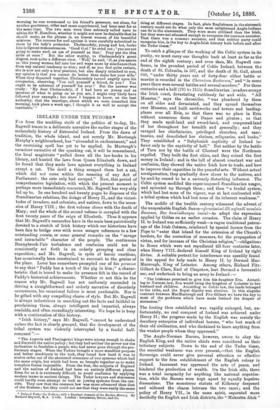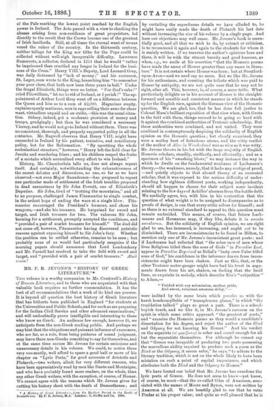IRELAND UNDER THE TUDORS.*
FAR from the madding strife of the politics of to-day, Mr. Bagwell traces in a deliberate narrative the earlier stages of the melancholy history of distressful Ireland. From the dawn of tradition, the whole island, and not merely Mr. Murtough Murphy's neighbourhood, has "abounded in enchantment," and the exorcising spell has yet to be applied. In Idurtotigh's veracious narrative of the speaking cat, it will be remembered,
the local magistrate "pulled down all the law-books in his library, and hunted the laws from Queen Elizabeth down, and he found that they made laws against everything in Ireland except a cat. The devil a thing escaped them but a cat, which did not come within the meaning of any Act of Parliament : the cats only had escaped." Now, this period of comprehensive legislation, with which the present moment is perhaps more immediately concerned, Mr. Bagwell has very ably led up to. In one hundred and twenty pages he disposes of the Scandinavian relations, the doings of Henry IL, and the vicissi- tudes of invaders, and colonists, and natives, down to the acces- sion of Henry VIII.; the first volume closes with the death of Mary; and the whole of the second volume is occupied with the first twenty years of the reign of Elizabeth. Thus it appears that Mr. Bagwell's researches have in the main been patriotically devoted to a stretch of Irish history which our historians have been fain to bridge over with some meagre references to a few outstanding events, or some general remarks on the "savage and intractable" character of the people. Tho continuous Donnybrook-Fair turbulence and confusion could not be consistently set forth in an orderly grouping and clear exposition ; and Mr. Bagwell, in spite of heroic exertions, has occasionally been constrained to succumb to the genius of the place. Lever has somewhere prompted one of his personce to say that "Paddy has a touch of the pig in him ;" a charac- teristic that is bound to make its presence felt in the record of Paddy's historical achievements. Whether or not this be the reason why Mr. Bagwell has not uniformly succeeded in driving a straightforward and orderly narrative of disorderly occurrences, his occasional failure is most pardonable. Nor is he gifted with any compelling charm of style. But Mr. Bagwell is always industrious in searching out the facts and faithful in proclaiming them, always intelligent and impartial, always readable, and often exceedingly interesting. We hope he is busy with a continuation of this history.
"Irish history," says Mr. Bagwell, "cannot be understood unless the fact is clearly grasped, that the development of the tribal system was violently interrupted by a feudal half. conquest ": —
"The Angevin and Plantageneb kings were strong enough to shake and discredit the native policy ; but they had neither the power nor the inclination to fendalise a people who had never gone through the pre- liminary stages. When the Tudors brought a more steadfast purpose and better machinery to the task, they found how hard it was to evolve order out of the shattered remnants of two systems which had the same origin, but which had been so brought together as to make complete fusion impossible. From the first, the subjects of England and the natives of Ireland had been on entirely different planes. Even for us it is extremely difficult to avoid confusion by applying modern terms to ancient things. The Tudor lawyers and statesmen could hardly even attempt to look at jarring systems from the out- side. They saw that the common law was more advanced than that of the Bretons ; but they could not see that they were really the same • Ireland Under the Tudors; with a Succinct Account of the Earlier History. By Richard Bagwell, M.A. 2 vole. London : Longmane„ Green, and Co. thing at different stages. In fact, plain Englishmen in the sixteenth century could not do what only the most enlightened Anglo-Indians can do in the nineteenth. They were more civilised than the Irish, but they were not educated enough to recognise the common ancestor. That there was a commo-t ancestor, and that neither party could recognise him, is the key to Anglo-Irish history both before and after the Tudor times."
To catch a glimpse of the working of the Celtic system in its purity, we must carry our thoughts back at least as far as the end of the eighth century ; and even then, Mr. Bagwell con- fesses, in the proudest period of Celtic Ireland, between the death of St. Columba, in 597, and the death of St. Gall, about 640, "under thirty years out of forty-four either battle or murder is recorded in the Chronicon Scotorunt," and "in some years there were several battles and several murders." For three centuries and a half (795 to 1155) Scandinavian :nvaders occupy the Irish coast, devastating ruthlessly far and wide. "All Munster," says the chronicler, "was plundered by them on all sides and devastated, and they spread themselves over Munster, and built earthworks and towers and landing- places over all Erin, so that there was no place in Erin without numerous fleets of Danes and pirates ; so that they made spoil-land and sword-land, and conquered-land of her throughout her breadth and generally ; and they ravaged her chieftainries, privileged churches, and sanc- tuaries, and demolished her shrines, reliquaries, and books." They established a " Babylonish captivity of Ireland in- ferior only to the captivity of hell." But neither by the battle of Tara nor by the battle of Clontarf were the Northmen expelled. They built the first cities, and they coined the first money in Ireland ; and in the lull of almost constant war and confusion, they showed the native Irish how to trade, and how to improve their capacities in the peaceful arts. Without actual amalgamation, they gradually drew closer to the natives, and by-and-by ceased to be a seriously disturbing influence. The Celtic system modified the super-imposed Scandinavian usages, and sprouted up through them ; and then "a feudal system, which had lost none of its vigour, was at last confronted with a tribal system which had lost none of its inherent weakness."
The middle of the twelfth century witnessed the advent of the unspeakable English Saxon —ferocissimi ilU nefandi nominis Saxones, Deo hominibusque invizi—to adopt the expression applied by Gildas on an earlier occasion. The claim of Henry II. to Ireland was sufficiently weak—a vague traditional patron- age of the Irish Ostmen, reinforced by special licence from the Pope to "enter that island for the extension of the Church's borders, for the correction of manners, for the propagation of virtue, and for increase of the Christian religion,"—obligations to Rome which were not repudiated till four centuries later, when Henry VIII. declared himself King of Ireland by right divine. A suitable pretext for interference was speedily found in the appeal for help made to Henry II. by Dermod Mac- Murrough, King of Leinster. Among others, Richard Fitz- Gilbert de Clare, Earl of Chepstow, lent Dermod a favourable ear, and undertook to bring an army to Ireland. :—
" The Irishman promised to give him his daughter Eva. Accord- ing to Norman law, Eva would bring the kingdom of Leinster to her husband and children. According to Celtic law, the lands belonged to the tribe, and the Royal dignity was elective. In this singular contract between llaoMurrough and Fitz-Gilbert we have the key to most of the problems which have made Ireland the despair of statesmen."
The footing thus established was rapidly enlarged, bat, un- fortunately, no real conquest of Ireland was achieved under Henry II; the progress made by the English was mainly the desultory enterprise of individual barons, "who lost much of their old civilisation, and who disdained to learn anything from the weaker people whom they oppressed."
The Anglo-Norman Barons, however, swore to obey the English King, and the native chiefs were considered as their tributary subjects. Down to the end of the Tudor times, the essential weakness was ever present,—that the English Sovereign could never give personal attention or effective support to the firm establishment of the English colony in Ireland. Incessant war oppressed the arts of peace, and hindered the production of wealth. On the Irish side, there was a total incapacity for anything like national organisa- tion, while the Barons were kept apart by equally hopeless dissensions. The monstrous statute of Kilkenny deepened and widened the chasm between the two races ; and the policy of Henry VII., in the same spirit, separated more decidedly the English and Irish districts, the " Mahratts ditch" of the Pale marking the lowest point reached by the English power in Ireland. The Acts passed with a view to checking the abuses arising from non-residence of great proprietors, led directly to the result that the Crown become one of the greatest of Irish landlords. Still, at all times the eternal want of means vexed the rulers of the country. In the thirteenth century, neither tallage for the King nor tithe for the Pope could be collected without well-nigh insuperable difficulty. Lawrence Samercote, a collector, declared in 1254 that he would "rather be imprisoned than crucified any longer in Ireland for the busi- ness of the Cross." Henry VIII.'s Deputy, Lord Leonard Grey, was daily distressed by "lack of money ;" and his successor, St. Leger, soon wrote to the King, beseeching him "to remember your poor slave, that hath now been three years in hell" Under the frugal Elizabeth, things were no better. "For God's sake !" cried Fitzwilliam, " let me be rid of Ireland, or I perish !" The ap- pointment of Arthur Lord Grey went off on a difference between the Queen and him as to a sum of £2,000. Magazines empty, captains openly mutinous, men in rags selling their arms for sheer want, victuallers unpaid and on strike,—this was the usual situa- tion. Sidney, indeed, got a moderate provision of money and troops, grudgingly ; but then he was considered a necessary Viceroy, and he would not go to Ireland without them. There was no consistent, thorough, and properly supported policy in all the centuries. Mr. Bagwell observes that Henry VIII. might have succeeded in Ireland by his patient, tentative, and conciliatory policy, but for the Reformation. "By upsetting the whole ecclesiastical structure," however," Henry left the field clear for Jesuits and wandering friars ; and his children reaped the fruits of a mistake which neutralised every effort to win Ireland."
History, Mr. Chamberlain tells us, does not always repeat itself. And certainly, notwithstanding the exhaustiveness of the recent debates and discussions, no one, so far as we have observed—not even Major Saanderson—has proposed to repeat one particular mode of settlement of the Irish troubles proposed in dead earnestness by Sir John Perrott, one of Elizabeth's Deputies. Sir John, tired of "trotting the mountains," and all to no purpose, challenged James Fitzmaurice to single combat, in the ardent hope of ending the wars at a single blow. Fitz- maurice encouraged the President's humour, and chose his weapons,—and eke his trousers. He bargained for sword and ta.rget, and Irish trousers for two. The valorous Sir John, burning for a settlement, promptly accepted the conditions, and "provided a pair of scarlet trousers for himself." The duel did not come off, however, Fitzmaurice having discovered patriotic reasons against exposing himself to Sir John's fury. Whether the problem can be settled otherwise, remains to be seen ; but probably none of us would feel particularly sanguine if the morning papers should announce that Lord Londonderry and Mr. Parnell had resolved to take the field with sword and target, and "provided with a pair of scarlet trousers." Abs it omen!



































 Previous page
Previous page